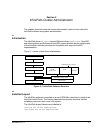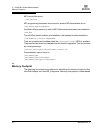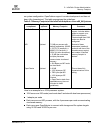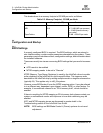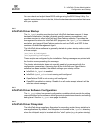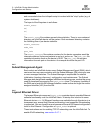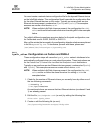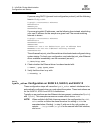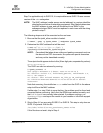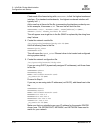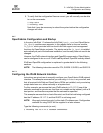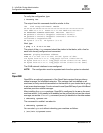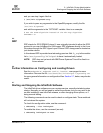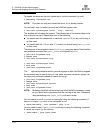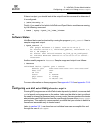
2 – InfiniPath Cluster Administration
Configuration and Startup
2-8 IB6054601-00 D
Q
If you are using DHCP (dynamic host configuration protocol), add the following
lines to ifcfg-eth2:
# QLogic Interconnect Ethernet
DEVICE=eth2
ONBOOT=yes
BOOTPROTO=dhcp
If you are using static IP addresses, use the following lines instead, substituting
your own IP address for the sample one given here
.The normal matching
netmask is shown.
# QLogic Interconnect Ethernet
DEVICE=eth2
BOOTPROTO=static
ONBOOT=YES
IPADDR=192.168.5.101 #Substitute your IP address here
NETMASK="255.255.255.0"#Normal matching netmask
TYPE=Ethernet
This will cause the ipath_ether Ethernet driver to be loaded and configured during
system startup. To check your configuration, and make the
ipath_ether Ethernet
driver available immediately, use the command (as root):
# /sbin/ifup eth2
4. Check whether the Ethernet driver has been loaded with:
$ lsmod | grep ipath_ether
5. Verify that the driver is up with:
$ ifconfig -a
2.4.6.2
ipath_ether Configuration on SUSE 9.3, SLES 9, and SLES 10
These configuration steps will cause the ipath_ether network interfaces to be
automatically configured when you next reboot the system. These instructions are
for the
SUSE 9.3, SLES 9 and SLES 10 distributions.
Typically on servers there are two Ethernet devices present, numbered as 0 (eth0)
and 1 (eth1). This example assumes we create a third device, eth2.
NOTE: When multiple InfiniPath chips are present, the configuration for eth3,
eth4, and so on follow the same format as for adding eth2 in the
examples below. Similarly , in step 2, add one to the unit number, so
replace
.../00/guid with /01/guid for the second InfiniPath interface,
and so on.




